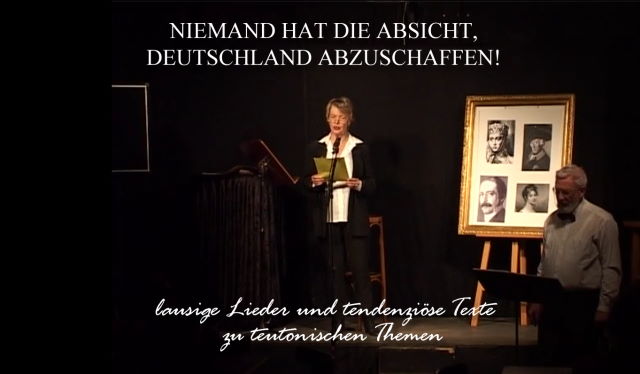- The "Hundred Day Programme" that is contained within the DK-declaration from 15 October 2000 and which has been criminalised through an indictment, is in no way whatsoever suited to disturb public peace for it has been known to the public since summer 1992 in the form of lectures, since January 1993 due to having being published in the "Staatsbriefe" and in addition has been published on the Internet since October 2000, without once having disturbed the public peace.
- The assertion of the indictment that the Deutsches Kolleg denies "all foreigners living in Germany all basic rights" is completely false. This assertion is also wrong because in any commonweal's policy on foreigners only natives and native organs of state are political subjects, whereas the foreigners are political objects, i.e. they are the political object, irrespective of their wholly indisputable quality of being legal subjects, i.e. persons, with all their basic and other rights.
- The assertion of the indictment that the mere "fact of being a foreigner" leads, according to the Hundred Day Programme, "to the criminalisation of all foreigners yet remaining in Germany regardless of the legal status acquired previously in case they do not leave Germany voluntarily" is absurd due to the following reasons:
- Foreigners must leave the country if the law of the country, an order based on this, or if the responsible body of the territorial sovereignty orders such.
- A foreigner is criminalised if he does not follow the order to leave the country, and the order threatens punitive action in such a case. To either implement or create the penal basis for these cases is part of the content of the Hundred Day Programme's recommendations on foreign policy. In the indicted version, these recommendations are, however, not at all aimed at an FRG-government, but at a Provisional Reich Government that has been appointed by the constitution-granting National Assembly of the German People.
- In any sovereign commonweal, the transformation of an object of foreign policy into a subject of foreign policy is only possible for the price of the deforeignisation of the foreigner (so-called integration): he must wholly surrender his being a foreigner and become a native! The prerequisite of naturalisation is a completed denaturisation. Each sovereign will determine the conditions of the possibility and the scope of the desirability of naturalisations as well as the stringency of the regulations concerning denaturisation according to its will.
- The political department of the public prosecutor's office in Berlin claims that the Deutsches Kolleg has "insulted parts of the population" (the foreigners) and that it "incites to hatred". The diction of the Hundred Day Programme is, however, neither one of hatred nor one of any other emotion, but an administrative diction written in the mode of suggestion, not of enforcement.
- From a note in the inquiry files it follows that the political department of the prosecutor's office in Berlin was put under pressure from representatives of the Jewish community to initiate criminal proceedings against the Deutsches Kolleg because it demands the ban of the Jewish communities. Since this demand cannot, however, be subsumed under the FRG's elastic clause concerning disposition (§130 Penal Code), spurious arguments taken from the Hundred Day Programme were used as a pretext.
- The Hundred Day Programme and the "Draft of a Constitution" (Staatsbriefe 1/92) which preceded it, together with some other texts of the Deutsches Kolleg, belong into the literary category of political utopias. Famous works are found in this category, e.g. Plato's "Republic", Machiavelli's "Prince", Thomas More's "Utopia" or Campanella's "City of the Sun". Plato was temporarily enslaved when the attempt at realising his political utopia failed, Machiavelli was tortured after a regime change in Florence, Thomas More was executed by Henry VIII due to his political steadfastness and Campanella spent 27 years in gaol. Seemingly, political persecution is the fate of political utopias, but is not at all detrimental to their posthumous fame. From this viewpoint of eternity, the Deutsches Kolleg confidently faces its conviction, without concealing, however, that it would consider an acquittal due to proven innocence a more useful decision for the sake of the court's future peace of mind.











